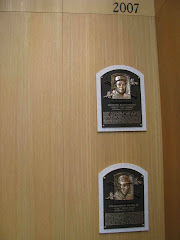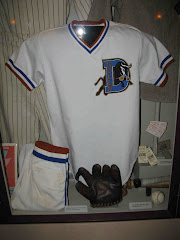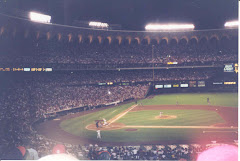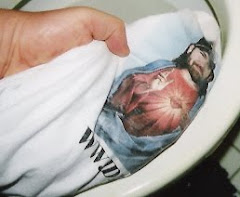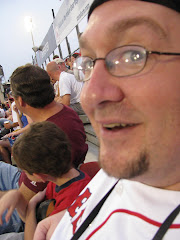Andre Ethier part 2... oh, how the mightily above average have fallen.
The streak hits 30 and stops there.
So it goes.
 But alas, when one gets thirty games in a row, that's the mark of success, but when one fails 46 times in a row and has a career average of .170, that's the mark of futility.
But alas, when one gets thirty games in a row, that's the mark of success, but when one fails 46 times in a row and has a career average of .170, that's the mark of futility.
I guess you can call him the 2011 Jason Varitek of his day. He was a good backstop that called the game well, but in the end... he never hit above .200. Too bad because he never had a George Brett character (or Bruce Bochte and Tom Paciorek) to playfully create a Mendoza Line in the stats to remember him by.
From 1901-1911, he played the game and finished with no seasons above the Mendoza Line. He hit 2 home runs in his storied career, and while that may have got him some lovin' from the ladies, I'm sure it made a couple of pitchers want to jump off of the Brooklyn Bridge. The first of these was in his rookie year with the Reds, and the second one was 8 years later with the Brooklyn Superbas whose legend is almost as lost as Bergen's is.
Nevertheless, he is the epitome of failure in major league history, and that is saying something. Maybe with that being said, his backstop ability to call pitches is better than that of Jarrod Saltalamacchia, whose non-ability just continues to amaze all who wonder how Boston could be so free spending on everyone from Daisuke Matsuzaka to Wacky Lackey and not pony up for someone with more upside than "if he works out, the sub 7 figure contract will seem like a bargain and make up for the adventure story that is played every time Daisuke gets to 2 strikes and can't close the deal.
Yep... Bergen was something in his day, and perhaps it was an act of niceness that he stuck around. Compared to Mark Reynolds' over-priced and high strikeout self (or Austin Jackson for that matter), Bergen's one in 7 K rate for a career is still better than 1 every 3 or less for some of the free swinging no power hitters of 2011. Granted, he's not Ted Williams (27) or Joe Dimaggio (13) in 1941, but we can't always have a choice to choose between the .400 guy or the guy with 56 games in a row (or 74/75 games that he hit in).
But if Ethier is our mark of success, let us wish him well. If he's a flash in the pan... this year's Willie Tavarez, at least he topped it out and got to 30 games.
That is saying something.
The streak hits 30 and stops there.
So it goes.
 But alas, when one gets thirty games in a row, that's the mark of success, but when one fails 46 times in a row and has a career average of .170, that's the mark of futility.
But alas, when one gets thirty games in a row, that's the mark of success, but when one fails 46 times in a row and has a career average of .170, that's the mark of futility.I guess you can call him the 2011 Jason Varitek of his day. He was a good backstop that called the game well, but in the end... he never hit above .200. Too bad because he never had a George Brett character (or Bruce Bochte and Tom Paciorek) to playfully create a Mendoza Line in the stats to remember him by.
From 1901-1911, he played the game and finished with no seasons above the Mendoza Line. He hit 2 home runs in his storied career, and while that may have got him some lovin' from the ladies, I'm sure it made a couple of pitchers want to jump off of the Brooklyn Bridge. The first of these was in his rookie year with the Reds, and the second one was 8 years later with the Brooklyn Superbas whose legend is almost as lost as Bergen's is.
Nevertheless, he is the epitome of failure in major league history, and that is saying something. Maybe with that being said, his backstop ability to call pitches is better than that of Jarrod Saltalamacchia, whose non-ability just continues to amaze all who wonder how Boston could be so free spending on everyone from Daisuke Matsuzaka to Wacky Lackey and not pony up for someone with more upside than "if he works out, the sub 7 figure contract will seem like a bargain and make up for the adventure story that is played every time Daisuke gets to 2 strikes and can't close the deal.
Yep... Bergen was something in his day, and perhaps it was an act of niceness that he stuck around. Compared to Mark Reynolds' over-priced and high strikeout self (or Austin Jackson for that matter), Bergen's one in 7 K rate for a career is still better than 1 every 3 or less for some of the free swinging no power hitters of 2011. Granted, he's not Ted Williams (27) or Joe Dimaggio (13) in 1941, but we can't always have a choice to choose between the .400 guy or the guy with 56 games in a row (or 74/75 games that he hit in).
But if Ethier is our mark of success, let us wish him well. If he's a flash in the pan... this year's Willie Tavarez, at least he topped it out and got to 30 games.
That is saying something.





